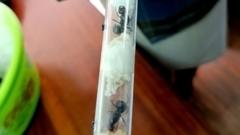The seizure of hundreds of giant African harvester ants, valued as exotic pets in Europe and Asia, marks a breakthrough case by the Kenya Wildlife Service (KWS) in combatting unusual wildlife crimes.
Landmark Insect Smuggling Case in Kenya Highlights Shift in Trafficking Patterns

Landmark Insect Smuggling Case in Kenya Highlights Shift in Trafficking Patterns
Four men face prosecution in Kenya for attempting to smuggle hundreds of prized ants, signaling a troubling trend in wildlife trafficking.
In a groundbreaking development, four individuals have admitted guilt in relation to a substantial insect smuggling operation in Kenya, where they attempted to illicitly export a vast number of highly prized ants. The Kenya Wildlife Service (KWS), typically engaged in the conservation of larger wildlife like lions and elephants, described this incident as a "landmark case" in the country’s fight against emerging patterns in wildlife trafficking.
During a recent operation, authorities successfully intercepted the smugglers, who had skillfully concealed hundreds of African harvester ants in specially designed test tubes and syringes lined with cotton wool. The KWS noted that these arrangements could allow the insects to survive for up to two months, demonstrating a premeditated effort to bypass security measures. Each tube contained two to three ants, aimed at reaching lucrative markets in Europe and Asia, where such exotic species are coveted as pets.
This seizure not only highlights the growing demand for rare insect species among collectors—who maintain the ants in controlled habitats called formicariums—but also indicates a concerning shift in trafficking methods from traditional wildlife to lesser-known species crucial to ecological systems. The individuals apprehended in this case included two Belgians, a Vietnamese national, and a Kenyan, all arrested following a coordinated intelligence operation that underscores the commitment of KWS to protect biodiversity.
Furthermore, the giant African harvester ant, or Messor cephalotes, is renowned for being the largest of its kind, with specimens reaching up to 20mm and queens up to 25mm. Although this particular species isn't sold by importers like Pat Stanchev of Best Ants UK, it exemplifies the appeal of oversized insects to pet enthusiasts.
Protected under international biodiversity agreements, the illegal trafficking of these ants has prompted action from Kenyan authorities. KWS has indicated that this case represents a significant step in enforcing regulations against unconventional wildlife crimes, sending a strong message globally about the commitment to address the smuggling of underrepresented species. The four accused individuals are set to face sentencing shortly, as agencies continue to tackle this troubling aspect of wildlife trade.



















